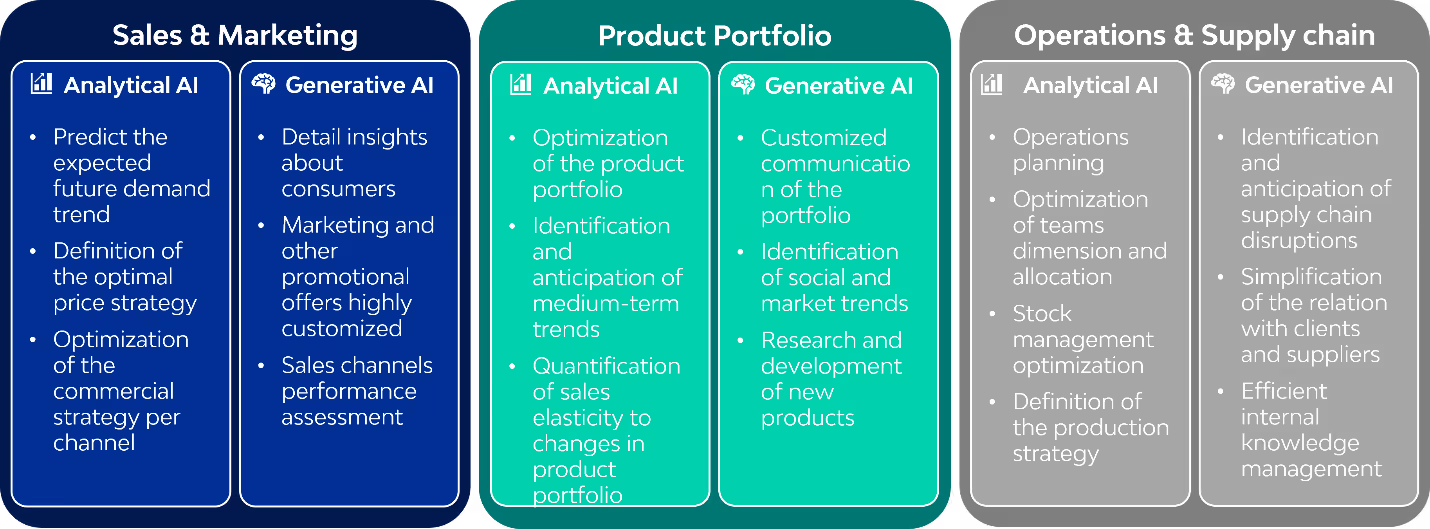Our AI-generated summary
Our AI-generated summary
Artificial Intelligence (AI) is rapidly becoming the cornerstone of business innovation, yet the consumer goods sector still lags in fully unlocking its transformative power. While 72% of companies already integrate AI into their operations (according to Forbes), many in consumer goods struggle to move beyond isolated use cases. The gap isn’t about access to technology, it's about knowing how to apply it strategically for meaningful, sector-specific impact.
In an era marked by global uncertainty, AI offers a clear path to resilience and growth. By turning vast volumes of data into actionable insights, AI empowers companies to make faster, smarter, and more sustainable decisions.
Understanding AI: Analytical vs. Generative
To harness AI effectively, it’s crucial to distinguish between its two primary forms:
- Analytical AI works with structured data to support forecasting, optimization, and automation. It’s the brain behind smarter operations and predictive insights.
- Generative AI deals with unstructured data (like text, images, and video) to generate content and simulate scenarios. It excels in creativity, adaptability, and contextual understanding.
Recent advancements in models such as ChatGPT, Gemini, and Copilot have extended the reach of Generative AI across the entire value chain - from production floors to customer service desks - making it more accessible and strategically valuable than ever before.
AI in action: unlocking value across the value chain
Rather than viewing AI as a standalone tool, leading companies are merging the predictive power of Analytical AI with the creative versatility of Generative AI. Here are three critical areas where this combined approach is reshaping the consumer goods landscape:
1. Marketing & Sales
- Analytical AI helps forecast demand based on pricing trends and market behavior.
- Generative AI enables hyper-personalized marketing by analyzing consumer behavior and crafting targeted messaging.
Together, they increase campaign effectiveness, optimize channel strategy, and boost ROI.
2. Product Portfolio Management
- Analytical AI detects emerging trends, helping companies stay ahead of market shifts.[DL1]
- Generative AI supports micro-segmentation of consumer groups, enabling highly tailored product strategies.
This synergy leads to faster, more accurate decisions and a more agile product lifecycle.
3. Operations & Supply Chain
- Analytical AI is already optimizing production schedules, inventory levels, and distribution.
- Generative AI assists with problem-solving, workflow simplification, and intelligent scenario planning.
The result? Reduced costs, improved resource efficiency, and a more resilient supply chain.

A roadmap for AI-driven transformation
Despite some success stories, many consumer goods firms have yet to realize AI’s full potential. Those that act now are not only improving margins, they're shaping the future of the industry.
To get started, organizations should:
- Map priority areas focused on efficiency, growth, and sustainability.
- Conduct a thorough diagnostic to identify opportunities and define the AI transformation journey.
- Invest in team capability-building, especially at the executive level, to foster a data-driven culture.
At LTPlabs, we’ve seen firsthand how executive education (like Analytics 4 Executives) and targeted diagnostics (Analytics Discovery) lay a strong foundation for successful AI adoption.
In consumer goods companies, the question is no longer if AI will change the game, it’s how fast companies can adapt to stay competitive. The potential is enormous, but realizing it requires vision, commitment, and a clear strategy. AI is not just a tool. It's the next competitive advantage.
Our AI-generated summary
Our AI-generated summary











.avif)



